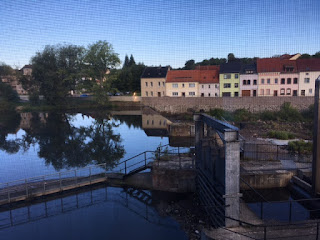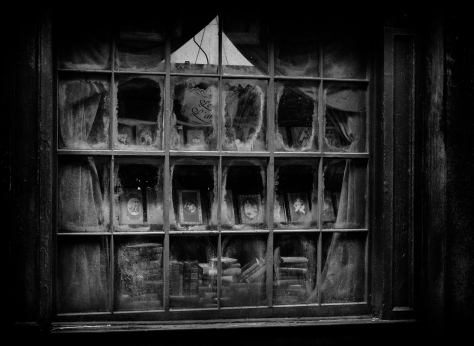 |
| Chemnitz |
Wednesday 24 August
We pack and have our last breakfast at the hotel. The sun is blazing outside and the river looks more beautiful than ever. At 10am Tobi, Ringo and Jakob call for us for the the trip to Chemnitz which is less than half an hour’s drive. Jakob tells us about his current course which is switching to Chemnitz from Leipzig because Leipzig was not right for some reason. He is quite a shy boy but maintains a certain cool while remaining very friendly. He is slowly becoming himself. His English is very good.
Chemnitz was Karl-Marx-Stadt after the war till 1989 when it reverted to its earlier name. It was heavily bombed during the war and the city centre destroyed so it was entirely re-planned on the socialist, post-Bauhaus model, more with blocks than streets, the streets wide and arranged in grids. “Chemnitz is an attractive city which pleases the eye. At first sight its "face" is perhaps a little bit austere, but then it becomes more and more friendly,” says the website. In so far as austerity can possess a kind of gaiety Chemnitz has it. Large as it is it doesn’t look busy. and the marvellous Gunzenhauser collection is practically empty but for us. It is a treasure trove of mostly German artists from Impressionism, through Die Brucke, Der Blaue Reiter, the Neue Sachlichkeit and Expressionism with a comprehensive group of works by Otto Dix, Max Beckmann, but also Jawlensky, Münter, Schmidt-Rottluff, Heckel, Kirchner, Felixmüller and three by Paula Modersohn-Becker (would there were more!) Discoveries for us included Georg Schrimpf and, in the temporary exhibition, Reza Derakshani. We wandered around almost alone, starting at the top and descending the red staircase that the banker-collector Gunzenhauser insisted on, floor by floor.
Then we walked into what would have been and in its way still was the centre, by the old Rathaus, but the old buildings are oddments among the cubes of concrete and glass, the limited gaiety of which was down to what is probably the fabled sense of German precision. We stopped to pay homage to the vast granite head of Karl Marx in front of his most famous words, Workers of the World Unite, engraved on the wall behind him in various languages, although the English version used a different translation.
Then we walked into what would have been and in its way still was the centre, by the old Rathaus, but the old buildings are oddments among the cubes of concrete and glass, the limited gaiety of which was down to what is probably the fabled sense of German precision. We stopped to pay homage to the vast granite head of Karl Marx in front of his most famous words, Workers of the World Unite, engraved on the wall behind him in various languages, although the English version used a different translation.
*
The GDR wasn’t loathed by everyone, nor was it all humourlessly stern. Our friends had been socialists before the fall of the wall and they were the same socialists now, all kindness, sweetness and good humane intention. They were, after all all, our hosts. It is still possible to be socialist in that humane sense and live in hope that the world might be more equally divided and that Nazi crimes be honestly addressed. They carry on working to that end even now, against the odds both in larger political terms and in localised conservative terms. And I must admit that when I consider Hungary, I myself sometimes prefer the Hungary of the pre-1989 period to the one currently represented by Viktor Orbán and his sub-fascist nationalist administration. I even think I preferred the people as they were then, squeezed together as they were by a common condition that was hardly affluent, somewhat chaotic and certainly not free from corruption but somehow tolerable because it was shared, to the ever more savage and hostile society that has since emerged.
It was hot, very hot where there was no shade. A party was being planned in one of the two main squares and marquees were being erected. Two human statues stood apparently suspended in mid air but they had dismantled their apparatus by the time we returned to them.
We drove back the way we had come and on towards Leipzig and the airport, dropping Jakob off at his flat in a poorer part of the old city, something of a ghetto with boarded windows and graffiti but hardly dangerous, according to Jakob. Our farewells were long and warm. Tobi gave us a jar of home made honey that security allowed through. The metal pins inside my chest holding my ribcage together had been picked up by X-ray at Stansted but caused no problem here. We waited a couple of hours, ate a canteen-style meal, sipped a vodka and nibbled a small piece of chocolate before settling down to read or solve puzzles. I carried on with Chesterton’s The Man Who Was Thursday, returning to it after over forty years: melodramatic prose, childish metaphysics, wilful paradox but with a mad, almost surreal streak, like Fantomas’s English catholic maiden aunt, sweetly, grandiosely barmy and inconsequently entertaining.
Then the plane arrived with the jolliest, self-consciously ragged Ryan Air crew I have yet come across and a couple of male passengers near us, possibly off-duty soldiers, harmlessly larking about, and chatting up a pretty girl I took to be Indian but who might have been Syrian. She seemed to be enjoying it. We got home about 1am. I stowed away the invaluable memory-stick, reassured the cat and fell asleep.
 |
| Jakob, Tobu, Clarissa, Ringo in Chemnitz |
 |
| Tobi, Uli, Clarissa in Penig |
 |
| Clarissa, Emilie in Penig (no pics of Jan and Janine, alas) |










